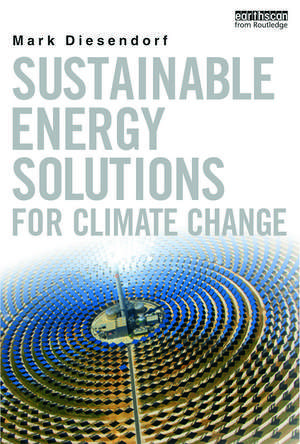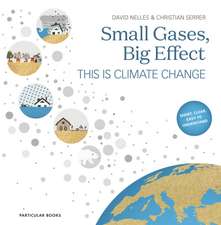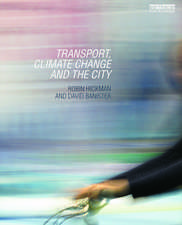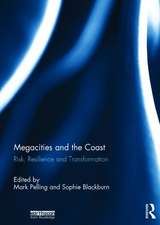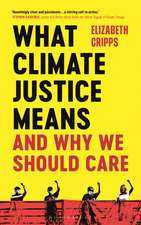Sustainable Energy Solutions for Climate Change
Autor Mark Diesendorfen Limba Engleză Paperback – 23 mai 2014
Sustainable Energy Solutions for Climate Change brings together the science, technology, economics and policy issues to provide a unique and truly interdisciplinary approach. It details the enormous recent changes in the energy sector and profiles the renewable energy technologies that can transform our fossil-fuelled energy systems into ecologically sustainable ones.
The book provides in-depth analysis of:
• scenarios for transitioning our polluting energy system to one basedon the efficient use of renewable energy
• sustainable transport and planning for better cities
• why nuclear energy is not the answer
• the politics and policies of climate change mitigation
• myths about wind and solar energy and energy efficiency
• what people can do to overcome vested interests and push reluctant governments to take effective action.
Taking stock of the latest advances in energy efficiency and energy storage, the book is of interest to students at undergraduate and postgraduate level studying energy policy and economics, environmental policy and environmental politics as well as professionals and policy makers.
| Toate formatele și edițiile | Preț | Express |
|---|---|---|
| Paperback (1) | 464.00 lei 6-8 săpt. | |
| Taylor & Francis – 23 mai 2014 | 464.00 lei 6-8 săpt. | |
| Hardback (1) | 1279.65 lei 6-8 săpt. | |
| Taylor & Francis – 30 mai 2014 | 1279.65 lei 6-8 săpt. |
Preț: 464.00 lei
Preț vechi: 545.87 lei
-15% Nou
Puncte Express: 696
Preț estimativ în valută:
88.80€ • 92.36$ • 73.31£
88.80€ • 92.36$ • 73.31£
Carte tipărită la comandă
Livrare economică 14-28 aprilie
Preluare comenzi: 021 569.72.76
Specificații
ISBN-13: 9780415706148
ISBN-10: 0415706149
Pagini: 380
Ilustrații: black & white illustrations
Dimensiuni: 156 x 234 x 20 mm
Greutate: 0.54 kg
Ediția:New.
Editura: Taylor & Francis
Colecția Routledge
Locul publicării:Oxford, United Kingdom
ISBN-10: 0415706149
Pagini: 380
Ilustrații: black & white illustrations
Dimensiuni: 156 x 234 x 20 mm
Greutate: 0.54 kg
Ediția:New.
Editura: Taylor & Francis
Colecția Routledge
Locul publicării:Oxford, United Kingdom
Public țintă
Postgraduate and UndergraduateCuprins
Foreword by Ian Lowe Part 1: Basic concepts and scenarios 1. Energy and its greenhouse gas emissions 2. Energy resources and technologies 3. Sustainable energy scenarios Part 2: Which technologies are sustainable? 4. Saving energy 5. Renewable energy technology impacts 6. Is nuclear energy a solution? 7. Transport and urban form Part 3: Policies, strategies, politics and actions 8. General policies for the Great Transition 9. Targeted policies for renewable energy 10. Who will drive the transition? 11. Citizen action 12. Conclusion Appendix: What you can do
Recenzii
‘A compelling call to action from Professor Mark Diesendorf – a leading voice of reason, careful analysis, keen insight, and common sense on energy. Read, enjoy, adopt, and prosper!’–Amory B. Lovins, Co-founder and Chief Scientist, Rocky Mountain Institute
‘This book shows that a better future is possible.’–Ian Lowe, Emeritus Professor and President, Australian Conservation Foundation
"The in-depth analysis and the suggestions/recommendations in this book have the potential to change the world in positive ways. Summing Up: Highly recommended. All levels/libraries." -L. E. Erickson, Kansas State University, CHOICE Reviews, February 2015
‘This book shows that a better future is possible.’–Ian Lowe, Emeritus Professor and President, Australian Conservation Foundation
"The in-depth analysis and the suggestions/recommendations in this book have the potential to change the world in positive ways. Summing Up: Highly recommended. All levels/libraries." -L. E. Erickson, Kansas State University, CHOICE Reviews, February 2015
Descriere
This book is a call to action on climate change, filled with clear and detailed information on the strategies we need to adopt to ensure a sustainable future for the planet. We have the technology needed to transform our fossil-fuel based energy systems into ecologically sustainable ones, and this book argues that all we now need is the political will to do so. It uniquely brings together both the science and policy issues to provide a truly interdisciplinary approach.
